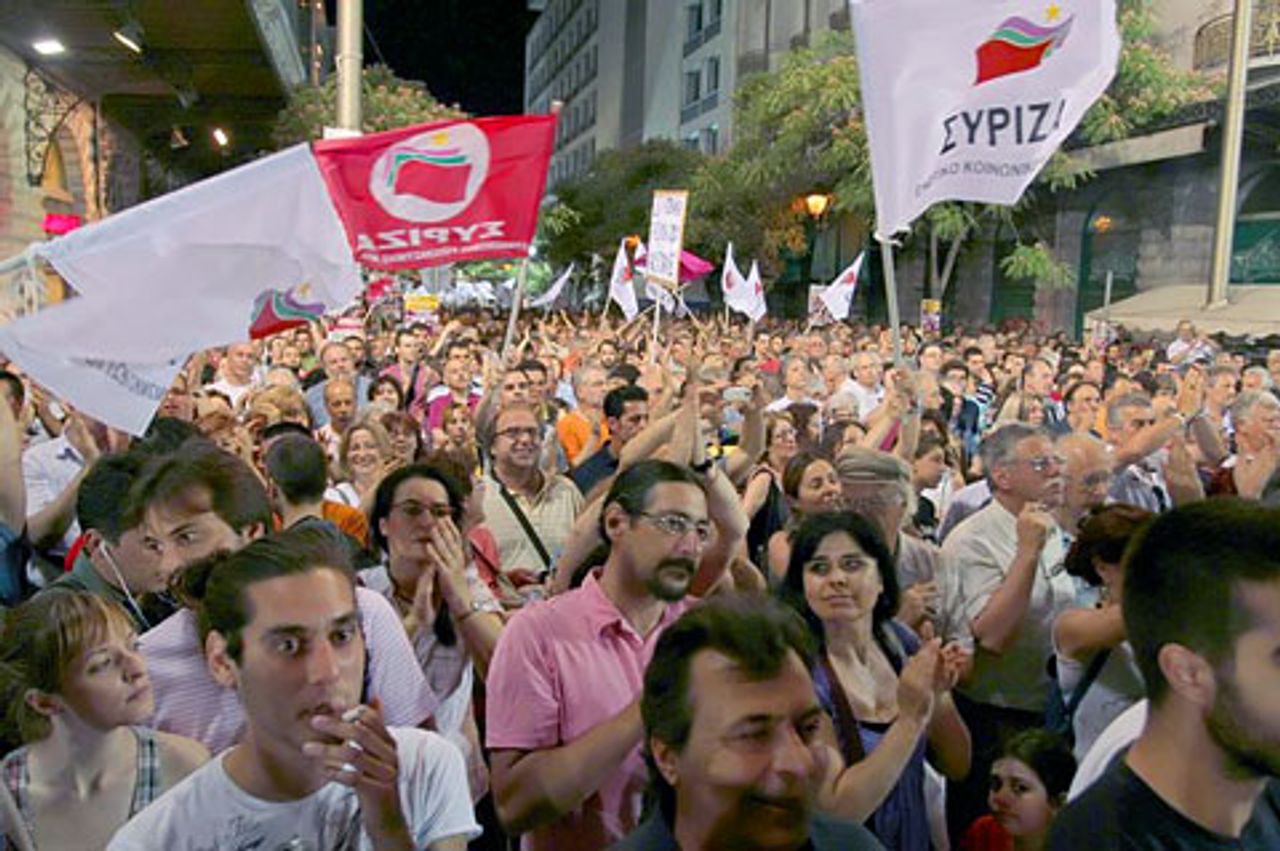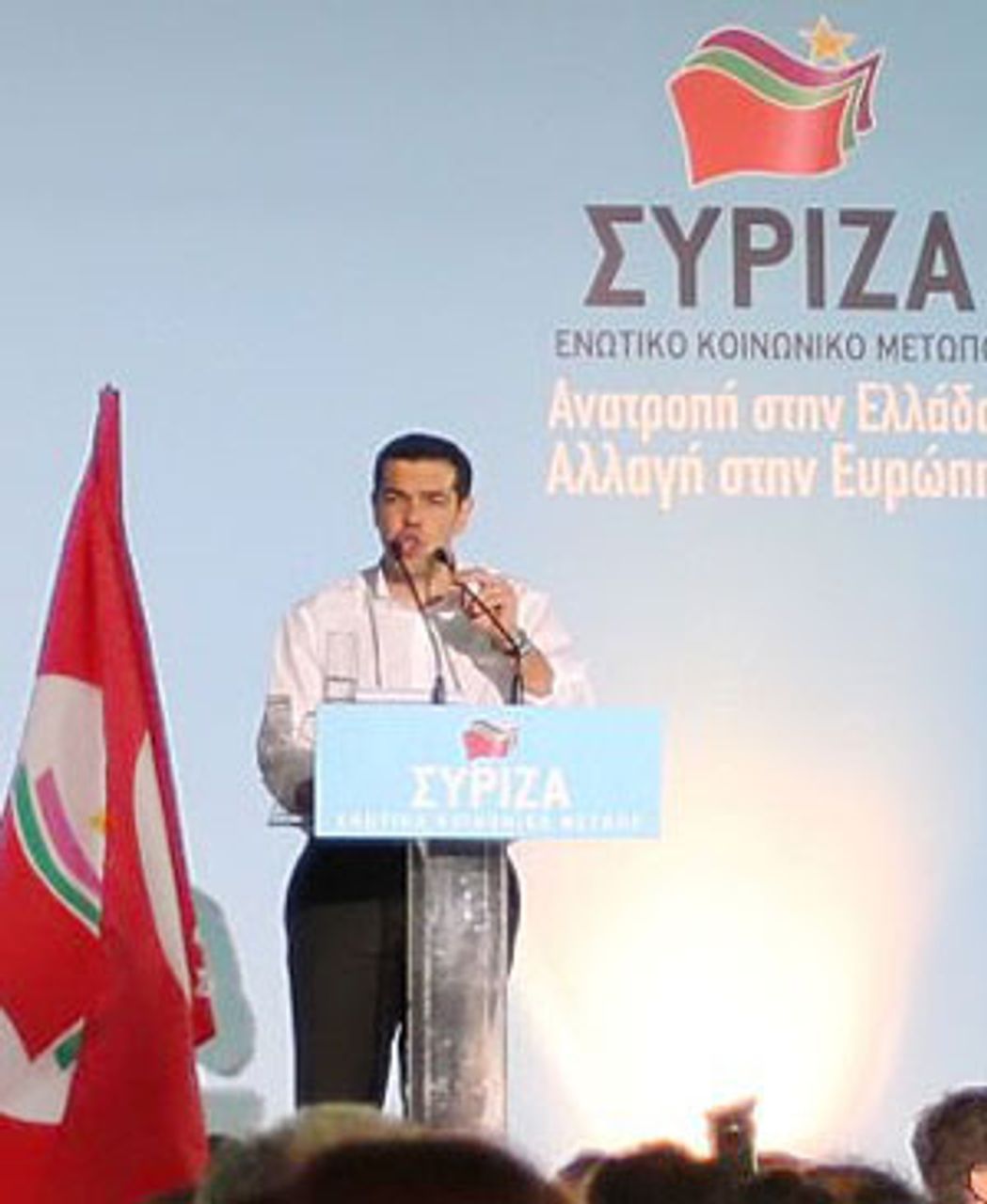On Thursday, the Coalition of the Radical Left (SYRIZA) held its final rally in Athens before the elections on Sunday. The event was marked by a profound contradiction: while many of those present hoped SYRIZA would put an end to disastrous austerity measures that have devastated Greece, SYRIZA itself is preparing to take over the reins of government to repay the banks and negotiate austerity measures with the European Union (EU).
 A section of the audience at the Syriza rally
A section of the audience at the Syriza rallyThousands gathered on Omonia Square. The rally drew people from all social layers and ages. In addition to middle class people, youth and students, there were also workers, the unemployed and pensioners.
People attending the rally told the WSWS they hoped for an end to the social attacks dictated by the EU in recent years. These have led to real wage cuts of up to two thirds, a rise in youth unemployment to over 50 percent, and mass misery.
Grigori believes a renegotiation of the memorandum could find an echo all over Europe. He is a retired physics professor and has not received his pension for the last two years. He always voted for SYRIZA, while his wife, who also came to the rally, had previously voted for the conservative New Democracy (ND). Her pension has also been cut for several years. Now they hope that SYRIZA leader Alexis Tsipras, as a new force, could renegotiate the memorandum.
Vangelis also struggles to make ends meet. He is 28 years old and works as a computer scientist; his salary has been reduced by 30 percent, while taxes and prices have risen massively. He believes that SYRIZA is the only hope for the future: “The Troika and the memorandum have made our lives worse. We can’t carry on like this.” His girlfriend Areti, who works as a teacher and gets only €500 (US$630) per month after the cuts, agreed.
Paris and Sana are unemployed. They had a shop which they had to close as a result of the crisis. They have always supported SYRIZA, saying that it brings hope to people: “SYRIZA puts the life and dignity of the people back in first place.” Although the crisis was international, corruption in politics in Greece had only made it worse, they said.
Paris added that there was no real democracy anymore: “If Tsipras has problems negotiating the memorandum after the election, we must support him. Everyone must take to the streets across Europe.”
Ioannis just hopes that SYRIZA can negotiate better terms with the EU and the creditors than the other parties. He is a 25-year-old trained engineer who came to the rally by accident. After his salary was initially reduced by 15 percent, he lost his job and was hired by another company for only €500 per month. “That is common for new-hires,” he says.
Ioannis cannot completely agree with SYRIZA’s EU perspective. Greece should not remain in the euro zone at any price. “I will not accept wages of €500,” he said. “The euro means nothing to me if I am paid such wages.”
 Tsipras speaking
Tsipras speakingIn his speech, Tsipras tried to disguise the logic of his pro-EU policy with populist demands and thus make it palatable for the banks and EU officials as well as his audience. Over a hundred journalists from around the world had come to the rally.
The SYRIZA head touched on the hopes of the rally participants. He repeatedly claimed that if he wins the election, the memorandum will be history. He complained about the wage cuts of recent years, the increase in unemployment, the reduction of pensions, the higher taxes and the mass privatization of state enterprises. “Greece was a European and international experiment, and the Greek people were the guinea pigs,” he said. “Over the last two years, we have suffered a social catastrophe.”
Tsipras affirmed what he had already said in several interviews with the international media and at news conferences in Paris and Berlin: SYRIZA is no threat to the European institutions and the international policy of austerity, and his party was ready to acknowledge the debt, to remain in the EU and to continue the necessary “structural reforms.”
He repeatedly stressed that under his leadership Greece would not leave the EU, but function better inside it. “We take responsibility for the government of our country, and we guarantee a stable, safe and just way for the people and the country in the euro area,” he said. On this basis, he would negotiate with the EU: “We will replace the ineffective memorandum with a national reconstruction plan, a plan for a social, just way out of the crisis for the country. And we guarantee Greece’s membership in the euro zone.”
He promised EU representatives that only SYRIZA could offer reasonable negotiations on the terms of the loan agreement, because only SYRIZA speaks for the people who have not signed the old memorandum and who act independently of the corrupt structures in the country.
In this way he offered to enforce the cuts, with some cosmetic changes, against the resistance of the population, since several EU representatives have long made clear that they will exclude the country from the euro zone rather than accept substantial changes to the austerity measures.
The hypocrisy of Tsipras’s assertion that social decline can be stopped within the EU was clear when he came to the topic of the loan agreements with Spain. “On Sunday, we go to the polls also with an eye on Spain,” he said in his speech. “Spain has negotiated and was successful. It has received economic support from Europe without implementing a memorandum. Despite the threats and blackmail of the creditors, it is staying in the euro without a memorandum.”
In reality, in recent years Spanish governments have implemented massive social cuts at the behest of the EU. Unemployment has risen to 25 percent, and to over 50 percent among young people. The government wants to save €27 billion this year and the same amount again next year. This is Tsipras’s plan for Greece.
Tsipras is fully aware of this. He also knows that a continuation of the austerity measures by SYRIZA will lead to sharp social struggles. For this reason, he also adopted certain right-wing, nationalist tones in his speech. He stressed several times that SYRIZA is the only really patriotic force, and that his government would take the Greek flag out of the hand of German Chancellor Angela Merkel. He also repeated his promise to raise the local police presence.
